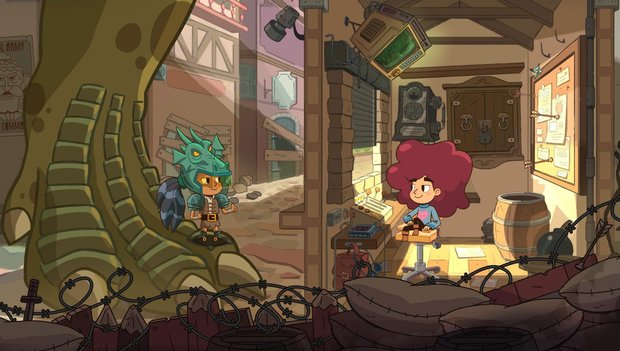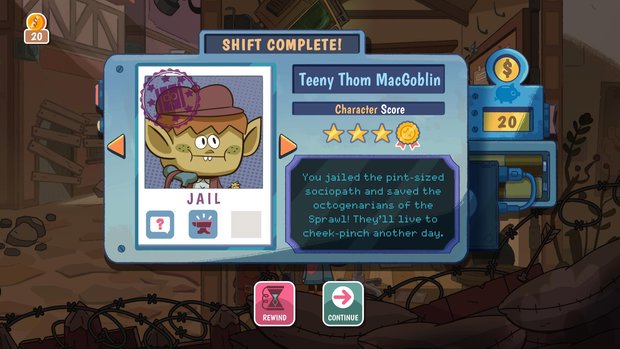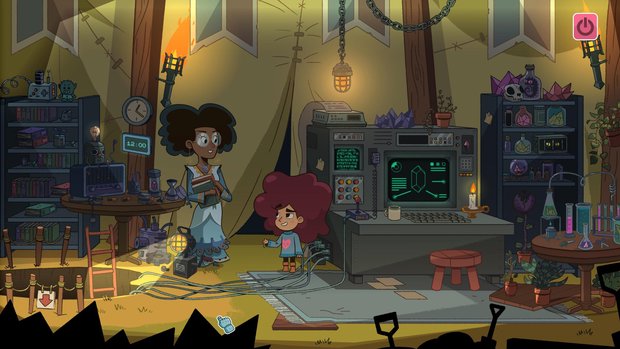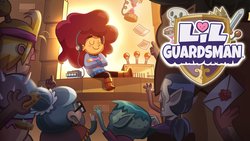Lil’ Guardsman review

- 1 Comment
A bit too much filler to watch out for in what’s otherwise a whole lot of fun in this charming fantasy deduction adventure
Ah, guard duty. That classic unenviable task, usually relegated to the most mundane (and often surly) of videogame NPCs. Doomed to languish in isolation at their posts, a gate guard in an adventure game is often more of a short-term obstacle to be overcome, rather than a living, breathing person with any sense of depth.
Lil’ Guardsman flips that whole dynamic on its head. Now you're the gate guard – and not just any regular gate guard, but the sarcastic, reluctant 12-year-old daughter of the town's actual gate guard, who's too busy gambling away his meager income to do his job. Oh, and in the process, you're also trying to save the city from a deep conspiracy, and somehow you've become the caretaker of an all-powerful item of cosmic importance that could shape the fate of the entire world. It’s very cleverly designed, and belly laughs abound, though the game has some pacing issues that hold it back from greatness.
Everything about Lil’ Guardsman is rather novel, but if you imagine a more casual approach to Papers, Please but set in Discworld, you'll have a pretty good idea of what to expect. It's a cozy and whimsical fantasy adventure meshed with a dark-humored bureaucracy satire. The hand-drawn aesthetic is 90% standard medieval fare, but the game isn't above adding some anachronisms and fourth wall breaks for the sake of a laugh: the tavern has neon lighting and a jukebox, Lil's guard shed comes equipped with an X-ray scanner, and Garby Bunches (the ambitious entrepreneur who sells useful items) looks like he wandered out of a 1990s office workplace comedy.

The plot follows the travails of the titular Lil, daughter of the lovable layabout Hamish, both of them trying to make a living while looking out for each other in "the Sprawl.” When Hamish gets the idea of making Lil cover for him so he can spend a bit more time gambling on Goblinball games, Lil's unexpected aptitude as a gate guard sets off a chain of events that leads to her working his gig on the regular, determining who can be let into the Sprawl and who needs to be kept as far from the city's interior as possible.
Gameplay is a bit of a strange beast. The main hook is within the guard duty sections. You'll have a shift (almost) every day, where a set number of citizens and interlopers need to go through you for processing before they can be allowed into the city. It's up to you to determine whether their stories cut the mustard, or if they're a danger that needs to be turned away. After a few in-game days, you even get the option to jail them, whether for necessary purposes or just for laughs.
Some characters will tempt you to betray your ethics with bribery to be let in (or to not let others in), leading to some moral conundrums that deepen the experience. There's even a few ways to get killed by the less-scrupulous ones if you take especially wrong actions around them, but not to worry – the game features a "Chronometer" for time travel that lets you go back in time to fix mistakes during your shift, whether to avert death or just to get a more ideal outcome.

Aiding you in the investigation are an array of tools with their own RPG-lite progression system, from the sometimes-overpowered truth spray to the odder and more specialty items like the decoder ring for cracking secret messages and a bullwhip for... well, whipping people. You also have access to a trio of city advisors, each with their own domain of focus, who are always just a phone call away from weighing in on your decision to allow or deny an unknown person into the Sprawl.
Unlike Papers, Please, which had its puzzles more in the "obsessively check over paperwork for signs of forgery" camp, Lil’ Guardsman is much more conversational. You'll be doing a lot of talking to the would-be entrants to the city, finding holes in their stories and using clues from their dialogue to determine the best course of action, whether it's making use of the right item or calling the proper advisor.
Additionally, instead of the realtime action of Papers, Please, progress in Lil’ Guardsman takes a turn-based approach, where each encounter allows you a total of only three actions to perform before you make your decision about whether someone's allowed in. Engaging in conversation, calling up an advisor, or using one of your tools will all use one of those three action points. You can even spend all three action points continuing to talk to your current citizen/victim, without any repeated dialogue. So considering that there's five different tools – plus optional one-off items you can collect and use – and three separate advisors to call up, you can't just try everything at your disposal during each encounter. You must be selective in your choices, keeping an ear out for anything that could be a lead and occasionally making wild stabs in the dark that may prove critical.
Each character you interact with at the guard shed acts as a standalone puzzle with multiple solutions. You'll be graded on your performance from 1 to 4 stars, where the highest rank is only achievable if you use stellar deductive reasoning to make the optimal conditions surface. At the end of every workday, you also get a little summary screen that humorously describes the fates of each character that came through, and there's an impressive amount of various outcomes based on your branching choices (not to mention the high possibility of seeing familiar faces pop up again later).

It's an interesting approach that's more like a strategy minigame, and the limited number of action points helps give Lil’ Guardsman an impressive degree of replayability. The sheer amount of choice and consequence makes it feel different from a typical adventure game and somewhat like a small BioWare RPG that just happens to have no combat. There's simply so much writing and voice acting in this game that you won't be able to experience in a single playthrough, and that's something to be celebrated.
When it all works, it works quite terrifically, but Lil’ Guardsman is never firing on all cylinders for long before settling into a state of comfortable competency. And that's a shame, because there's some really stellar stuff in here that's let down by the more phoned-in sections that held me back from diving in for a full replay, as curious as I was to do one.
Outside of the guard shed portions, the game takes on a totally different format, behaving more like a visual novel that has a point-and-click adventure coat of paint on top. When Lil's daily shift ends, she can (and often must) travel the city to join important meetings, run errands, and have optional encounters that flesh out the world and change the course of the story in fairly dramatic ways.

There aren't really puzzles here, per se, but the point-and-click sections do a good job feeling more game-y and interactive than the systems underpinning them might suggest. Unfortunately, most of the gameplay in these portions feels a bit like filler; it never takes up too much time, but the truly engaging standouts are few and far between. There's a moment where you become an unwitting participant in a game show that's so out of left field that it left me laughing from the sheer creativity, but more often than not, the point-and-click sections are stuffed with slow-paced, challenge-free fetch quests that I just wanted to get over with so the story could continue.
The mouse controls in these sections are also a little bit unwieldy. Hotspots don't simply highlight from a mouse-over; first you have to move Lil right next to them to even know if they're interactable – and even that can be finicky sometimes. More than once I couldn't interact with a character or object if I was too close to it, and had to do a little dance of moving Lil around until she was in just the right spot for the interaction to become available. It wasn't a huge hassle, but definitely felt odd for a game in this day and age to repeatedly struggle with hotspot interactions like that.
The most major problem for me was the pacing and size of the game. I clocked a total of eight hours in my single playthrough, which may not sound like a lot, but it sure felt like a lot for the story that's told. There are quite a few twists and a sense of scale that grows suitably epic toward the end, but I couldn't help but feel like Lil’ Guardsman could have been half the length and even more effective. Conversations can be long and plodding, and the game just has too many sections that felt like busywork.

The saving grace is the comedy, which frequently alternates from "fairly funny" to "side-splittingly funny." Every so often, something so delightfully hilarious and innovative would occur that elevated the whole experience and made it a joy to play. One visitor who bears more than a passing resemblance to Belle (of Beauty and the Beast) even launches into a full-blown musical number throughout the entire interrogation, which is uproarious. There's also a really funny level themed around night shift duty, where the deductive gameplay expands quite a bit and Lil must determine whether undesirable monsters like vampires and shapeshifters are trying to get into the city. It’s an inspired section that temporarily wiped away any sense of boredom that was beginning to creep in.
The guard shed sections are where the gameplay really shines, but there were a few too many times when I had to rewind time with the help of the Chronometer (using info I'd learned from my failures) in order to proceed with a decent outcome. That felt less like "brilliant detective work" and more like "cheating." There's also not a lot of strategy behind choosing which equipment to upgrade between shifts. You're mainly left to go with your gut, and many situations can be solved in multiple ways, so there may not really be a "wrong choice" here (but seriously, don't bother upgrading the metal detector – it’s largely redundant, and you'll get so much more use out of the truth spray and X-ray).
Thankfully the game's voice acting is pretty great across the board, and the music is a real standout, with a plethora of truly groovy tunes laying down some great upbeat rhythms that are still catchy, even weeks after last playing it. Visually Lil’ Guardsman also shines, with a pleasing art style that reminded me just a touch of the character designs in Gravity Falls. There isn’t a ton of animation on display, with conversation scenes opting to cycle character art through assorted still-frame poses, but characters emote strongly (and often hilariously) through their various expressions, and the approach ultimately feels like a creative choice rather than a budget-conscious one. The environments are also fun to traverse, from the home base of the Twisted Sisters Tavern (complete with Garby’s hastily erected back alley emporium), the Colosseum-sized Goblinball stadium, and mischievous jester Malcolm’s dungeon, where anyone you’ve arrested is almost sure to show up if you pay a visit.
While the scope of the narrative might get a little messy, there's some shining moments of really good storytelling, despite all the silliness. Things occasionally get more serious and a bit dark (with growing prejudice against goblins forming an anti-racism plotline) and in the case of Hamish and Lil's central storyline about flawed fatherhood, surprisingly touching.
Final Verdict
At its best, Lil’ Guardsman is utterly charming, creative, and a lot of fun, so it’s unfortunate that it gets bogged down by pacing issues that sometimes make it feel like a bit of a chore to play. On the flip side, it has a number of thigh-slapping comedic moments that were some of the most sublimely funny bits I've seen in a game in recent memory. Your mileage may vary, but the great parts ultimately make the experience worthwhile – I just wish more of the game reached that same outstanding level of quality.
Hot take
Lil’ Guardsman is a silly, high-fantasy take on Papers, Please that mixes deductive gameplay with goblins and wizards – what more could you want? Well, a tighter story with more consistent quality would have been great, but the end result is still very much worth playing for comedy fans.
Pros
- Great art style, crammed with personality
- The jokes are funny and frequently land hard
- Huge amount of branching choices, requiring several playthroughs to see everything
Cons
- Bloat and pacing issues bring the story's momentum down
- Controls are disappointingly awkward during the point-and-click adventure portions
Sean played Lil’ Guardsman on PC using a review code provided by the game's publisher.











1 Comment
Want to join the discussion? Leave a comment as guest, sign in or register in our forums.
Wow, I wasn't really into the Nickelodeon/Cartoon Network style of this, but you really make it sound like fun! Even with those more boring parts you mention...
Reply
Leave a comment